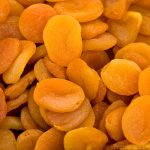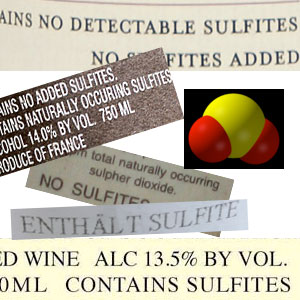Wine consumers and trade alike remain very interested in the wine and sulfites discussion. There have been many online articles and blog posts in the past year dedicated to this issue. “Sulfites in wine” is often the number one search term for visitors to my blog as well, even though I rarely write about sulfites.
This is what we know:

- Sulfites act as a preservative, being both anti-oxidant and anti-bacterial agents.
- A small percentage of the population has an allergic reaction to sulfites (according to the FDA, about 1% of the population, mostly asthmatics).
- Low levels of sulfites occur in wine naturally as part of the fermentation process.
- Sulfites are also present in numerous other foods and beverages like fruit juice, dried fruits, molasses, sauerkraut, pickles, corn syrup, packaged gravies and sauces, and vinegars.
- Wines labeled as “Organic Wine” in the United States must be made with organically grown grapes and have no added sulfites (there will still be low sulfite levels due to fermentation).
- There have been some very bad wines made with no added sulfites.
- There have also been some very bad wines made with buckets of added sulfites.
So now we know that there are always sulfites in wine, just in varying amounts. We also know that the presence of sulfites or lack thereof does not guarantee quality either way. There are many winemakers who say wine cannot be stable without sulfites and there are many winemakers who make stable wines with little to no added sulfites. It is true that the latter, low-sulfite wines must be made very carefully and with pristine grapes.

What we mean by “stable” is the ability to drink well for a time after opening the bottle. No-added-sulfite wines should be transported carefully and in a stable, cool environment to show at their best.
I am certainly no zealot when it comes to sulfites and have no apparent allergy to sulfites either. However, I do prefer a wine that has not been beaten into submission with loads of preservatives. Moderation seems to be the key (as with many things in life).
I have had some joyous drinking experiences with wines that had no added sulfites. Many winemakers who make natural wines add little to no sulfites. You can find these wines through importers like Savio Soares Selections, Jenny & Francois Selections and Louis/Dressner Selections.
There are many domestic wineries that add minimal to no sulfites as well, including Cooper Mountain, Donkey & Goat, Coturri, Clos Saron, Kevin Kelley’s NPA project, and many others.
Below are quotes from two wine professionals about no-added-sulfite wine.
“I haven’t noticed a higher ratio of faulty bottles, TCA or otherwise, with [Beaujolais producer and low-sulfite evangelist Jean] Foillard’s wine, and I’ve poured through probably thirty cases of it at this point, so don’t believe folks who insist that you must load up on sulfur if you want to ensure shelf-stability for your wine.”
Lou Amdur, Lou on Vine, Los Angeles
“I have approximately 15 completely un-sulfured wines on my wine list and at least another dozen with extremely low dosages of sulfur. Conventional wine makers will try and convince you that you cannot make wine without sulfur and that once you open one of these bottles, you must drink them right away. This just isn’t true. I experience on a daily basis the FACT that once opened, these natural wines drink for up to 2 weeks and sometimes even longer. They improve and become more exciting each day.
On the other hand, once a conventional bottle of wine is opened, I have to sell it within 3 or 4 days max before it is no longer drinkable.
These natural wines are certainly alive and their longevity and development once opened is extremely exciting!”
I have had some similar experiences. Just this past week I was running around to some restaurants and retailers in California, showing the buyers a no-added-sulfite Grenache made in 2006. I really took that wine for a test run through the streets of San Francisco, then back home to Los Angeles and it was drinking even better after all that action and being open for over 36 hours.
Sulfites are not a black and white issue and I am certainly not suggesting that all wines should be made with no added sulfites. What I am enthusiastic about is breaking through the industry myth that wines made with minimal sulfites are of a lesser quality or are only for short term drinking.
 – Amy Atwood: Wine Lover. Wine industry sales specialist, communicator and dealmaker since 1996. Organic and sustainable focus. Blogging at My Daily Wine.
– Amy Atwood: Wine Lover. Wine industry sales specialist, communicator and dealmaker since 1996. Organic and sustainable focus. Blogging at My Daily Wine.
